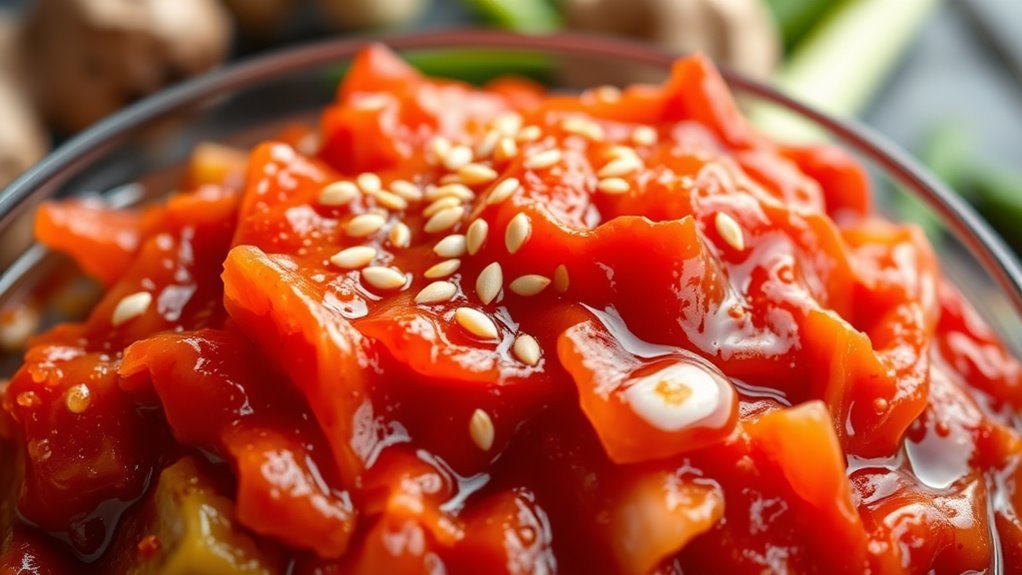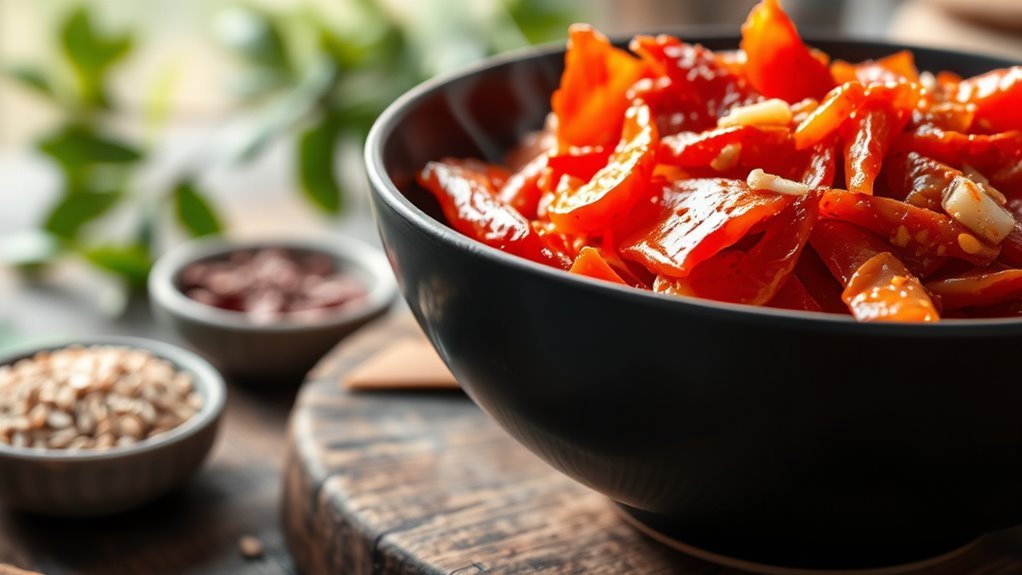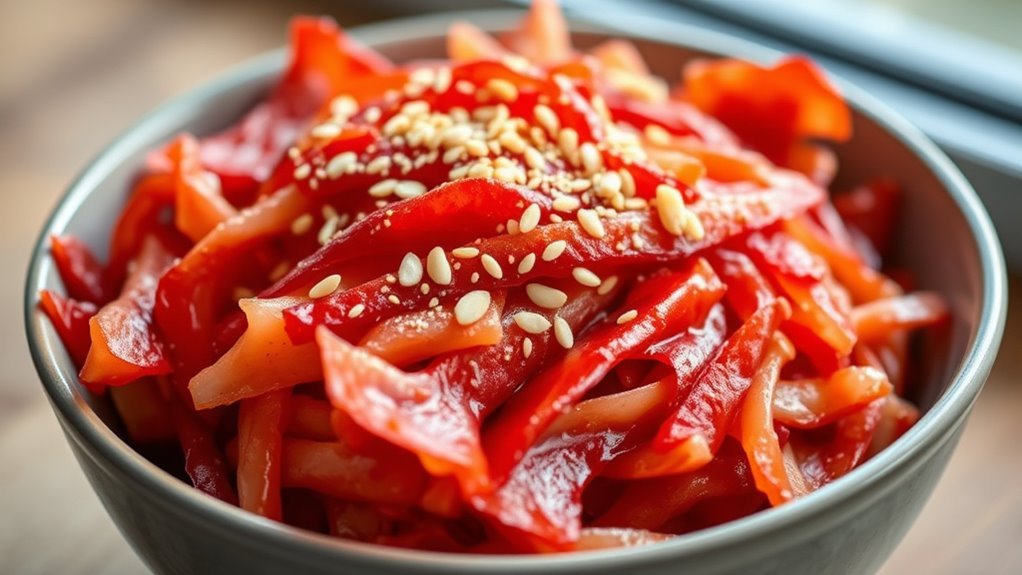Yes, kimchi is keto-friendly! This fermented dish typically contains only 1-3 grams of net carbs per serving, making it an excellent choice for your low-carb meals. Not only is kimchi low in calories, but it’s also rich in probiotics and essential vitamins, promoting gut health and overall wellness. Whether you make it at home or opt for store-bought, it can easily fit into your keto lifestyle. Discover even more ways to incorporate kimchi into your meals.
Understanding Kimchi and Its Ingredients

Kimchi, a staple in Korean cuisine, is a fermented vegetable dish that typically features napa cabbage and Korean radishes, along with a mix of seasonings like garlic, ginger, and chili pepper. The history of kimchi dates back over 2,000 years, evolving from simple pickled vegetables to the diverse varieties enjoyed today. The fermentation process is essential, as it not only preserves the vegetables but also enhances their flavors and adds beneficial probiotics. During fermentation, lactic acid bacteria thrive, creating a tangy taste and contributing to kimchi’s unique profile. Understanding these ingredients and the fermentation process can deepen your appreciation for this dish, empowering you to explore its rich culinary traditions while enjoying its vibrant flavors.
Nutritional Profile of Kimchi

Rich in nutrients, kimchi offers a compelling addition to a balanced diet. Packed with vitamins A, B, and C, it also contains essential minerals like calcium and iron. The fermentation process enhances its nutritional profile, allowing beneficial probiotics to flourish. These probiotics can improve gut health, supporting nutrient absorption and overall digestion. This means when you include kimchi in your meals, you’re not just adding flavor; you’re also boosting your body’s ability to absorb nutrients effectively. It’s a low-calorie food that provides essential nutrients without compromising your dietary goals. So, if you’re looking for a smart, nutritious choice, kimchi could be the perfect complement to your meals, offering both taste and health benefits in one delicious package.
Carbohydrate Content in Kimchi

When considering a keto-friendly diet, understanding the carbohydrate content of foods is essential, and kimchi is no exception. Generally, kimchi is low in carbohydrates, making it a suitable option for those on a ketogenic journey. The primary carbohydrate sources in kimchi come from the vegetables used, like napa cabbage, radishes, and carrots. Depending on the specific kimchi variations, the carbohydrate content can vary slightly, but most servings contain around 1-3 grams of net carbs per serving. This low-carb profile allows you to enjoy kimchi without derailing your keto goals. Just be mindful of portion sizes and any added ingredients that could increase carb counts. Overall, kimchi can be a flavorful addition to your keto meal plan.
Probiotics and Health Benefits of Kimchi
Kimchi is packed with probiotics that can greatly improve your gut health, supporting digestion and nutrient absorption. These beneficial bacteria also play a role in strengthening your immune system, helping your body fend off illnesses. Additionally, kimchi’s nutrient density means you’ll get essential vitamins and minerals with every bite, making it a smart addition to your diet.
Gut Health Improvement
As you explore the world of gut health, incorporating kimchi into your diet can be a beneficial choice due to its rich probiotic content. These probiotics help enhance your gut microbiome, which plays a vital role in overall health. By consuming kimchi, you’re not just enjoying a flavorful dish; you’re also providing your body with natural digestion support. The fermentation process involved in making kimchi produces beneficial bacteria that can aid in breaking down food and improving nutrient absorption. Additionally, studies indicate that a balanced gut microbiome can positively impact mood and energy levels. So, if you’re looking to enhance your gut health, adding kimchi to your meals can be an excellent step towards achieving that goal.
Immune System Support
While many foods can support your immune system, kimchi stands out due to its probiotic-rich profile. These probiotics, which are live beneficial bacteria, offer immune-boosting effects that can enhance your body’s defenses. When you consume kimchi, you’re not just enjoying a flavorful dish; you’re also reaping the fermented benefits that come from its ingredients, such as napa cabbage and radishes. Research suggests that these probiotics can help regulate immune responses, potentially lowering your risk of infections. Additionally, the fermentation process enhances nutrient absorption, making the vitamins and minerals in kimchi more bioavailable. Incorporating kimchi into your diet can be a delicious way to support your immune health while enjoying the freedom of flavorful eating.
Nutrient Density Benefits
Fermented foods like kimchi are celebrated for their impressive nutrient density, particularly due to their rich probiotic content. These beneficial bacteria enhance nutrient absorption, helping your body utilize vitamins and minerals more effectively. The fermentation process in kimchi also promotes vitamin synergy, meaning the nutrients work together to boost your overall health. Studies suggest that probiotics can support gut health, improve digestion, and even enhance immune function. By incorporating kimchi into your diet, you’re not just adding flavor; you’re also providing your body with a powerhouse of nutrients. So, if you’re seeking to optimize your wellness journey while enjoying delicious, low-carb foods, kimchi can be a fantastic addition to your keto-friendly lifestyle.
How Kimchi Fits Into a Keto Diet
Kimchi, a staple in Korean cuisine, can be a flavorful addition to your keto diet. It’s low in carbs and packed with nutrients, making it a great choice for those looking to maintain ketosis. The fermentation process not only enhances its unique flavor profiles but also offers impressive health benefits, like improved digestion and boosted immunity.
Here’s a quick overview of kimchi’s keto-friendly aspects:
| Benefit | Description |
|---|---|
| Low in Carbs | Typically contains fewer than 5g of carbs per serving. |
| Probiotics | Aids digestion and gut health. |
| Nutrient-Dense | Rich in vitamins A, B, and C. |
| Flavor Boost | Adds a spicy, tangy kick to your meals. |
| Versatile | Pairs well with various keto-friendly dishes. |
Portion Control and Serving Suggestions
When incorporating kimchi into your keto diet, it’s important to be mindful of portion sizes to maximize its benefits without overstepping your daily carb limit. A typical serving size of kimchi is about 1/4 cup, which contains roughly 1-2 grams of net carbs. This small amount can enhance your meals without compromising your keto goals.
For serving ideas, try adding kimchi to salads for a spicy crunch, or using it as a topping for grilled meats. You can also mix it into cauliflower rice or omelets for a flavor boost. Remember, moderation is key; adjust your portion sizes based on your overall carb intake to enjoy kimchi while staying on track with your ketogenic lifestyle.
Homemade vs. Store-Bought Kimchi
When choosing between homemade and store-bought kimchi, it’s important to evaluate the nutritional differences and your control over ingredients. Homemade kimchi often allows you to customize flavors and reduce added sugars or preservatives, while store-bought options can be more convenient but may contain unwanted additives. Understanding these factors can help you make a more informed choice that aligns with your keto diet goals.
Nutritional Differences Explained
While both homemade and store-bought kimchi can offer health benefits, their nutritional profiles can differ markedly. The fermentation process is a key factor; homemade kimchi often has live probiotics, enhancing gut health. You might find it richer in vitamins since you control the ingredients, allowing for a diverse range of vegetables. In contrast, store-bought options may contain preservatives, affecting their probiotic content. Additionally, the flavor profiles vary widely. Homemade kimchi can be tailored to your taste, whether you prefer it spicy or tangy. Store-bought varieties might lean towards consistency, sacrificing some of the unique flavors. Ultimately, understanding these differences can help you choose the best option for your keto lifestyle while enjoying the benefits of this beloved dish.
Control Over Ingredients
Choosing between homemade and store-bought kimchi often comes down to the level of control you want over the ingredients. When you make kimchi at home, you can choose your ingredient sourcing, ensuring they align with your dietary preferences. This can mean opting for organic vegetables or avoiding certain additives that store-bought varieties might include.
On the flip side, store-bought kimchi offers convenience, but you may encounter preservatives and flavor variations that aren’t to your liking. If you’re following a keto diet, you might find that homemade kimchi allows you to tailor the recipe to fit your carb restrictions. Ultimately, the decision hinges on how much you value ingredient control versus convenience in your culinary experience.
Alternative Low-Carb Fermented Foods
Although kimchi is a popular choice for those following a keto diet, there are several alternative low-carb fermented foods that can also provide similar health benefits. Fermented vegetables like sauerkraut and pickles are excellent low-carb snacks, packed with probiotics that support gut health. These options not only add flavor to your meals but also enhance digestion. You might also consider fermented radishes or carrots, which offer unique tastes and textures while keeping carbs low. Additionally, products like kefir and yogurt made from almond or coconut milk can be great alternatives, as they maintain a low carbohydrate profile. Exploring these choices allows you to enjoy the benefits of fermentation while staying aligned with your keto lifestyle.
Tips for Incorporating Kimchi Into Keto Meals
Incorporating kimchi into your keto meals can be both delicious and beneficial for your health, as it enhances flavor while providing probiotics that support gut health. Start by adding kimchi to your salads for a zesty twist; it pairs well with greens and avocados. You can also mix it into stir-fries or omelets for an extra kick. When exploring kimchi recipes, consider using it as a topping for grilled meats or cauliflower rice dishes. It complements low-carb meal pairings beautifully, like with chicken or tofu. Don’t shy away from using kimchi in soups or stews to boost flavor without adding carbs. Enjoy experimenting with this versatile ingredient to enhance your keto journey!
Frequently Asked Questions about Kimchi and Keto
1. Is kimchi keto-friendly?
Yes, kimchi is generally considered keto-friendly. It is low in carbohydrates and high in fiber, making it a suitable option for those following a ketogenic diet. A typical serving of kimchi contains around 2-3 grams of net carbs, which fits well within the daily carb limit for keto dieters.
2. What are the nutritional benefits of kimchi?
Kimchi is rich in probiotics, vitamins A, B, and C, and contains antioxidants. The fermentation process enhances its nutritional profile and supports gut health, which can aid digestion and bolster the immune system. Additionally, the presence of vegetables like cabbage and radishes contributes to its fiber content, promoting satiety in a low-carb diet.
3. Are there any types of kimchi that are not keto-friendly?
While most traditional kimchi recipes are keto-friendly, some variations may contain added sugars or high-carb ingredients that can increase the carb count. For example, kimchi made with sweeteners or certain fruits may not fit well within a ketogenic diet. Always check the ingredient list and nutritional information if you’re purchasing pre-made kimchi.
4. How can I incorporate kimchi into a keto diet?
Kimchi can be enjoyed in various ways on a keto diet. You can serve it as a side dish, add it to salads, or use it as a topping for meats and fish. Additionally, kimchi can be included in stir-fries or used to create flavorful soups and stews, enhancing the taste while keeping the carb count low.
5. Can I make my own keto-friendly kimchi at home?
Absolutely! Making your own kimchi allows you to control the ingredients and keep it keto-friendly. Use low-carb vegetables like napa cabbage, radishes, and green onions, and avoid adding any sugars. Instead of sweeteners, you can enhance the flavor with garlic, ginger, and red pepper flakes. There are many recipes available online to guide you through the fermentation process.
References
- https://en.wikipedia.org/wiki/Kimchi
- https://www.healthline.com/nutrition/what-is-keto#foods-to-eat
- https://www.ncbi.nlm.nih.gov/pmc/articles/PMC6410770/
- https://www.webmd.com/diet/what-is-keto-diet
- https://www.cdc.gov/nutrition/resources-publications/healthy-eating.html
- https://www.bbcgoodfood.com/howto/guide/what-keto-diet
- https://www.hsph.harvard.edu/nutritionsource/keto-diet/


